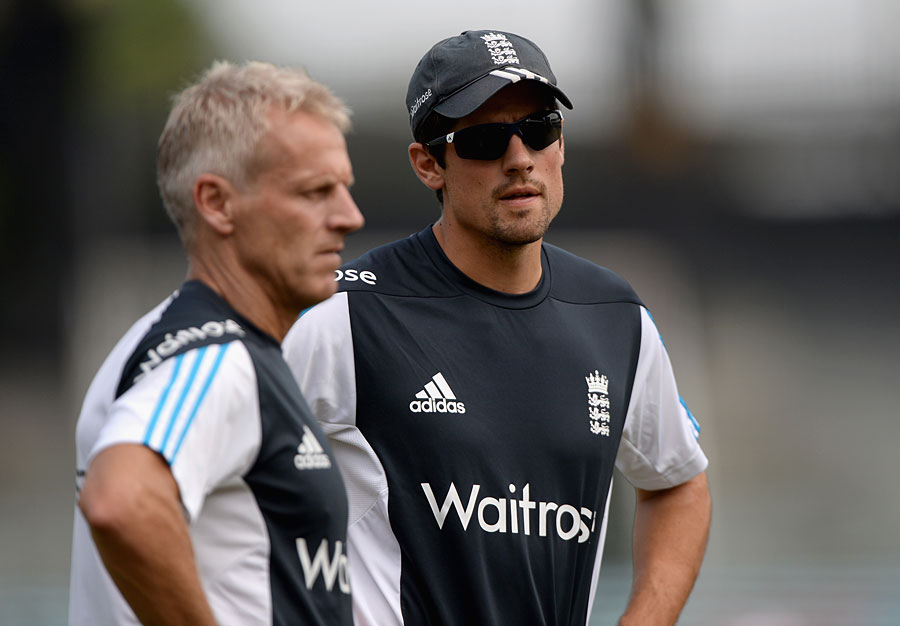Ed Smith in Cricinfo

Merely calling for the heads of Cook and Moores isn't going to solve England's ODI problems © Getty Images
That the England hierarchy wasn't sure, even last week, who should captain them at the World Cup is seen as a terrible lack of planning. You know the kind of critique: problems have been obvious for a long time, need for long-term thinking, absence of a strategic plan, last-minute wobbles…
The consensus, sadly, is wrong and misleading. Planning has very little to do with it. It usually doesn't. The problem isn't bad planning but bad performances. No plan, however good in principle, can survive consistent failure. The fans and the media, understandably, demand change. Indeed, it is not good plans that lead to good performances but good performances that make plans look good. So we have the causality back to front: we talk about the consequences believing them to be the cause. After all, bad teams have plans, too. As Mike Tyson said in a moment of wisdom, "Everyone's got a plan, and then they get punched on the mouth."
Both sides - management and media - are complicit in what is essentially a kind of fraud: the myth of the plan. My television set is always at risk of having heavy objects thrown at it when coaches emerge after a defeat with the message: "Our plans were good, but we just didn't execute them well." (I don't think much more of the alternative: "We need to tweak our plans a little bit.") Always, this is said with the conviction that part a) "the plan" and part b) "the execution" were of roughly equal value and significance. In fact, as every aspiring but failed billionaire knows all too well, plans are really quite easy to formulate - it's getting the job done that's so damned difficult. My plan as a batsman was to get a fine hundred every time. Good plan. Not sure there's a better one. It was the execution that kept proving tricky.
In truth, taking refuge in woolly talk about plans is a polite way of avoiding the subject: the players didn't play very well. Perhaps it's even worse than that and they aren't that good, full stop. This is obviously not press-conference territory. So, artful ways have been cultivated to avoid the subject. An implicit deal has been struck, perhaps without anyone realising it. The media agrees to give credence to the power of planning. But in return, when the wheels fall off, it reserves the right to lambast the management's bad planning. Clichés always develop for a reason: they suit everyone. So it is with planning. For the media (and the fans served by the media), insights into "planning" hint at the inside track, a glimpse at the secret whiteboard in the dressing room. To the management, it sounds strategic and proactive, as though they aren't just sitting on chairs fiddling with rosary beads and cursing under their breath.
| Occasionally a team with fewer resources and less raw talent can win. Far more often, however, the better team wins. Acknowledging that central fact is the essential foundation of any good strategy | |||
But how useful is planning as an explanation of events? When I was growing up in the 1980s, economic gurus constantly pointed at the apparently superior Japanese model. They argued that Japan was likely to pull ahead of America because its firms pioneered gradual consensus-building and long-term planning. But between 1990 and 2013 the American economy grew by 73% in real terms, whereas Japan's expanded by 24%. In the new economy, light-footed tinkering, the ability to "pivot" (a Silicon Valley phrase that means changing direction quickly and decisively) has often proved far more effective than long-distance planning.
I write all this as someone with a lifelong interest in strategy. By nature I am considered rational rather than spur-of-the-moment and devil-may-care. It is precisely because I care about planning - and recognise its occasional but serious contribution - that I also know the limits of its remit. Planning can certainly make a difference. From Odysseus' Trojan Horse to Jose Mourinho's Champions League title with Porto, we know that occasionally, very occasionally, a team with fewer resources and less raw talent can win. Far more often, however, the better team wins, regardless of what's written on the whiteboard. Acknowledging that central fact is the essential foundation of any good strategy.

| |||
Yet there is widespread reluctance to admit common sense. I see this first-hand when I sometimes play in amateur cricket. A bowler will be bowling all over the place - full tosses on leg stump, long hops wide of off stump. Clearly, he doesn't know where the ball is going. And then the captain calls him over for a long conversation about field placement, or, even more insanely, starts barking instructions like, "Come on! Like we talked about in the dressing room!" If the barrel of your gun is randomly crooked, the precision of your aim is totally irrelevant. You aren't going to hit the target. So first fix the gun, then we'll worry about the fine-tuning target practice.
As a professional player, I saw one spinner get a mild version of the yips. The coach's insight into the situation? "We need to work with him on how to construct an over." I'll say. He's got six balls to bowl (if we're lucky) and he doesn't know where any of them are going. Construct an over? Sounded awfully hi-tech to me, as though we were in masterful control of events, tweaking at the margins like chess grand masters. The truth was simpler: he was struggling to land the ball. "Constructing an over" was not a plan available to us.
England's bad ODI form is not about Alastair Cook. It is not about Peter Moores. It is not about being too loyal to the captain or too attached to outdated plans. The real problem is the England team. It isn't that good. Hasn't been for a long time. Especially in ODIs. Especially abroad. This is a difficult conversation, tending towards the nihilistic. So we talk about planning and tactics and captaincy instead.
How can the really salient facts be changed and improved? The whole cricketing culture in England needs to take white-ball cricket more seriously. We need better pitches for List A games at home that encourage attacking batsmanship and make greater demands of bowlers. We need to encourage innovation and risk at every level, not ask players to learn new tricks on the grandest stage.
That, I concede, is the outline of my own plan. But as I said at the beginning, plans are easy. It's getting them done that's so difficult.
No comments:
Post a Comment